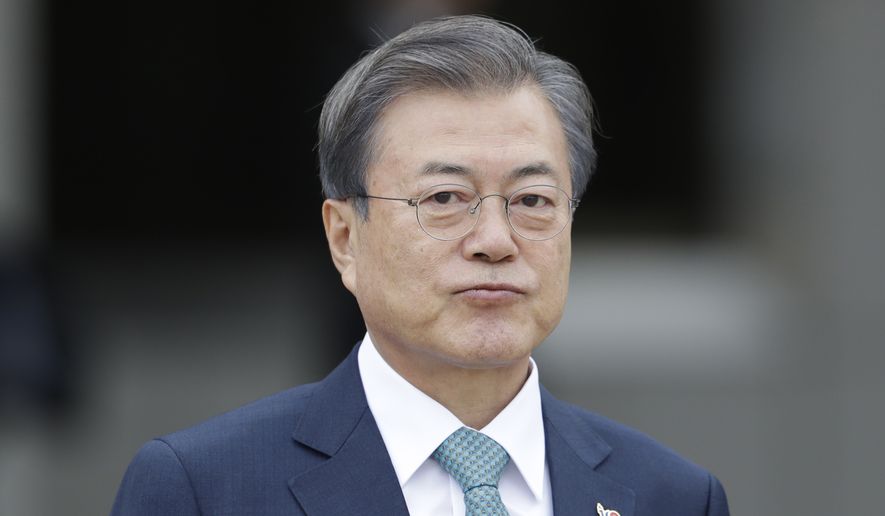OPINION:
The histrionics over the fate of the Korean Peninsula are about a roller coaster ride with no brakes. A new round begins Thursday with the arrival in Washington of President Moon Jae-in of South Korea. Despite the drama, a rekindling of attention toward the on-again, off-again dialogue between the United States and North Korea over denuclearization of the Korean Peninsula is more than welcome. Without the efforts of the central players, the nuclear threat posed by the North will keep the sword borrowed from Damocles hanging over the entire Pacific Rim.
The sudden collapse of the Hanoi summit in February dashed hopes that the bromance, such as it may be, between President Trump and North Korean leader Kim Jong-un would happily conclude the faceoff over Pyongyang’s escalating nuclear threats that took the world to the edge in 2017. The North’s appeal for the lifting of economic sanctions before a trustworthy commitment to denuclearization was a bridge too far. Mr. Trump responded with his signature negotiation tactic. He walked.
In an interview with CBS News, U.S. Secretary of State Mike Pompeo expressed confidence last week that the setback in Hanoi did no lasting damage to the search for a solution. Both principal leaders remain committed to the denuclearization process. A third summit between Mr. Trump and Mr. Kim is likely, he said, without speculating about a date.
He may be correct. President Moon is said to be determined while in Washington to kick-start the diplomacy by persuading President Trump to give a little ground on the sanctions that are buckling the Kim regime’s economy. United Nations-imposed trade restrictions include a ban on the purchase of North Korean seafood, iron ore and iron, and an order that North Korean expats working overseas return home. North Korean trade with its major benefactor, China, fell 87 percent last year.
Mr. Moon can reasonably ask for some sort of American sweetener to bring Pyongyang back to the negotiations, but not giving up anything would be reasonable, too. President Trump has reinforced his tough-cop credentials. Following the Hanoi summit collapse, the United States charged two Chinese shipping companies with violating sanctions. A subsequent good-cop gesture — with a snap-back provision in the event of new breaches — could demonstrate his sincere wish for the talks to get back on track.
But the rock-solid U.S. military commitment to guarantee South Korean security is non-negotiable. There are voices within President Moon’s advisers who want to take a soft approach toward the hard-as-nails regime in Pyongyang. They would applaud reducing the 23,000 U.S. troops posted in the South. Mr. Trump has already offered a goodwill gesture with the suspension of certain joint military exercises with South Korean forces.
Additional concessions would further unsettle Japan, which was rattled enough when North Korean test missiles overflew the Japanese islands two years ago. Moreover, China would see any U.S. demilitarization as an opportunity to further advance its hegemonic designs across the South China Sea. Weakness, perceived or real, always invites the bold to seize the advantage.
Americans and Koreans from both North and South have endured the effects of conflict on the Korean Peninsula for nearly 70 years. With a drama-free deal apparently unattainable, there’s nothing to be done but to bear up and ride the twists and turns of the roller coaster to a final resolution. There’s a Nobel Peace Prize out there waiting to be earned, but it can’t be a prize worth no more than something from a box of Cracker Jacks.
The good news is that the sanctions have delivered pain to Pyongyang. Pain is all that gets the attention of a hard and brutal regime. The ultimate goal of both North and South must be denuclearization, but with doughty and resolute diplomacy it can include the reunion of the two Koreas and the restoration of the peninsula to “the land of the morning calm.”




Please read our comment policy before commenting.